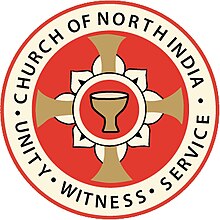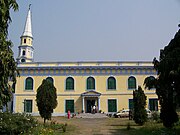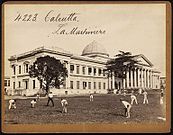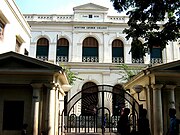Church of North India
The Church of North India (CNI), the dominant Protestant denomination in northern India, is a united church established on 29 November 1970 by bringing together the main Protestant churches working in northern India; it is a province of the worldwide Anglican Communion. It is the successor of Church of England in India along with the Church of Pakistan and the Church of South India. The merger, which had been in discussions since 1929, came eventually between the Church of India, Pakistan, Burma and Ceylon (Anglican), the United Church of Northern India (Congregationalist and Presbyterian), the Baptist Churches of Northern India (British Baptists), the Church of the Brethren in India, which withdrew in 2006, the Methodist Church (British and Australian Conferences) and the Disciples of Christ denominations.
The CNI's jurisdiction covers all states of the Indian Union with the exception of the four states in the south (Andhra Pradesh, Karnataka, Kerala and Tamil Nadu) and has approximately 1,250,000 members (0.1% of India's population) in 3,000 pastorates.[4]
History
| Part of a series on |
| Christianity in India |
|---|
 |
Ecumenical discussions with a view to a unified church was initiated by the Australian Churches of Christ Mission, the Methodist Church of Australia, the Wesleyan Methodist Church, the Methodist Episcopal Church and the United Church of Northern India during a round table meeting in Lucknow in 1929.
A negotiation committee was set up in 1951 using the plan of Church Union that resulted from the earlier consultations as its basis. The committee was composed of representatives from the Baptist Churches in Northern India, the Church of India, Pakistan, Burma and Ceylon, the Methodist Church (British and Australian conferences), the Methodist Church in Southern Asia and the United Church of Northern India.[5][6] The Methodist Episcopal Church, however, did not join the discussions and, in 1981, it became the Methodist Church in India (MCI).[7] In 1957, the Church of the Brethren in India and the Disciples of Christ denominations joined in the negotiations as well.
A new negotiation committee was set up in 1961 with representatives from all the abovementioned denominations. In 1965, a finalised plan of Church Union, known as the 4th Plan of Union 1965, was made. The union was formalised on 29 November 1970 when all the negotiating churches were united as the Church of North India with the exception of the Methodist Church in Southern Asia which decided not to join the union.
Beliefs and practices
The CNI is a trinitarian church that draws from the traditions and heritage of its constituent denominations. The basic creeds of the CNI are the Apostle's Creed and the Nicene Creed of 381 AD.
Liturgy
The liturgy of the CNI is of particular interest, as it combines many traditions, including that of the Methodists and such smaller churches as the Church of the Brethren and the Disciples of Christ. Provision is given for diverse liturgical practices and understandings of the divine revelation.
Governance
The polity of the CNI brings together the episcopacopal, the presbyterial and the congregational elements in an effort to reflect the polity of the churches which entered into union. The episcopacy of the CNI is both historical as well as constitutional. There are 26 dioceses, each under the supervision of a bishop. The main administrative and legislative body is the synod, which meets once every three years to elect a presiding bishop, called a moderator, and an executive committee. The moderator acts as the head of the church.
Social involvement
Social involvement is a major emphasis in the CNI. There are synodal boards in charge of various ministries: Secondary, Higher, Technical and Theological Education, Health Services, Social Services, Rural Development, Literature and Media. There is also a synodal Programme Office which seeks to protect and promote peace, justice, harmony and dignity of life.
The CNI currently operates 65 hospitals, nine nursing schools, 250 educational institutions and three technical schools. Some of the oldest and well-respected educational institutions in India like Scottish Church College in Calcutta, La Martiniere Calcutta, Wilson College in Mumbai, St. James' School, Calcutta, Hislop College in Nagpur, St. John's Diocesan Girls' School, Calcutta, St. Paul's School in Darjeeling, St. John's College in Agra and St. Stephen's College in Delhi , Bishop Cottons' School in Shimla, Sherwood College in Nainital are under the administration of the CNI.
Ecumenism
The CNI participates in many ecumenical bodies as a reflection of its commitment towards church unity. Domestically it participates in a joint council with the Church of South India and the Mar Thoma Syrian Church known as the Communion of Churches in India. It is also a member of the National Council of Churches in India. Regionally, the CNI participates in the Christian Conference of Asia and on an international level it is a member of the World Council of Churches, the Council for World Mission, World Alliance of Reformed Churches, World Methodist Council and in full communion with the Anglican Communion. The CNI is also in partnership with many other domestic, regional and international Christian agencies.
Gallery
-
St. Paul's Cathedral, Calcutta
-
St. Andrew's Church, Darjeeling
-
All Saints Cathedral, Allahabad
-
Cathedral Church of the Redemption, New Delhi
-
Christ Church, Shimla
-
St. John's Church, Meerut
-
St. James' Church, New Delhi
-
St. Thomas' Cathedral, Mumbai
-
The Wilson College, Mumbai
-
La Martiniere College, Lucknow
-
La Martiniere College, Calcutta
-
St. Paul's School, Darjeeling
-
St. Stephen's College, New Delhi
-
Scottish Church College, Calcutta
Present administrators
- Moderator: Bishop Pradeep Kumar Samantaroy, Bishop of Amristsar,
- Deputy moderator: Bishop Prem Chand Singh, Bishop of Jabalpur
- General secretary: Alwan Masih
- Honorary treasurer: Prem Masih
Dioceses
| Name | Headquarters | Location | Bishop | Website |
|---|---|---|---|---|
| Diocese of Agra | Agra | Uttar Pradesh, Uttarakhand | P.P Habil | [1] |
| Diocese of Lucknow | Allahabad | Uttar Pradesh | Peter Baldev | |
| Diocese of Amritsar | Amritsar | Punjab, India, Himachal Pradesh, Jammu and Kashmir | P.K. Samantaroy | [2] |
| Diocese of Barrackpore | Barrackpore | West Bengal | Moderator's Commissary- The Rt. Revd. Ashoke Biswas | |
| Diocese of Durgapur | Durgapur | Probal Kanto Dutta | ||
| Diocese of Calcutta | Kolkata | Ashoke Biswas | ||
| Diocese of Bhopal | Bhopal | Madhya Pradesh | ||
| Diocese of Jabalpur | Jabalpur | Prem Chand Singh | ||
| Diocese of Chota Nagpur | Ranchi | Jharkhand | B B Baskey | [3] |
| Diocese of Chhattisgarh | Raipur | Chhattisgarh | Robert Ali | |
| Diocese of Chandigarh | Ludhiana | Chandigarh, Punjab, India | Younas Massey | |
| Diocese of Gujarat | Ahmedabad | Gujarat | Silvans Christian | |
| Diocese of Delhi | New Delhi | Delhi, Haryana | Waris K. Masih| | |
| Diocese of Kolhapur | Kolhapur | Maharashtra | B. R. Tiwade | |
| Diocese of Bombay | Mumbai | Prakash D. Patole | ||
| Diocese of Marathwada | Aurangabad | M.U.Kasab | ||
| Diocese of Nagpur | Nagpur | Paul Dupare | ||
| Diocese of Nasik | Nasik | Pradip L. Kamble | ||
| Diocese of Pune | Pune | |||
| Diocese of Patna | Patna | Bihar | P.P.Marandih | |
| Diocese of Phulbani | Phulbani | Odisha | Bijay Kumar Nayak | |
| Diocese of Sambalpur | Balangir | Pinuel Dip | ||
| Diocese of Rajasthan | Ajmer | Rajasthan | ||
| Diocese of North East India | Shillong | North East India | Michael Herenz | |
| Diocese of Andaman and Nicobar | Port Blair | Andaman and Nicobar Islands | Christopher Paul | |
| Diocese of Eastern Himalaya | Darjeeling |
See also
- Anglican Communion
- Christianity in West Bengal
- Christian Conference of Asia
- Christianity in India
- Church of South India
- Malankara Mar Thoma Syrian Church
- Church of Pakistan
References
- ^ www.oikoumene.org/en/member-churches/church-of-north-india
- ^ Reformed Online : United Church of Northern India - Presbyterian Synod. Retrieved 17 June 2006
- ^ a b c "World Council of Churches - Church of North India". Retrieved 18 December 2009.
- ^ Reformed Online : "Church of North India". Retrieved 17 June 2006.
- ^ Empire Club Foundation : "Lambeth and Church Unity" - Rt Rev Frederick Hugh Wilkinson, Bishop of Toronto. Retrieved 17 June 2006.
- ^ IndianChristianity.org Church of North India. Retrieved 17 June 2006
- ^ Abraham, William J.; Kirby, James E. (24 September 2009). The Oxford Handbook of Methodist Studies. Oxford University Press. p. 93. ISBN 9780191607431.
While the Methodist Churches of British and Australian origin joined the two great unions of 1947 (Church of South India) and 1970 (Church of North India), the Methodist (Episcopal) Church refrained and, in 1981, was inaugurated as Methodist Church in India (MCI), autonomous, yet affiliated with the UMC.
External links
- Anglican Communion church bodies
- Anglican realignment denominations
- Christian denominations in India
- Christian denominations established in the 20th century
- Christianity in India
- Church of North India
- Church of the Brethren
- Members of the World Communion of Reformed Churches
- Presbyterianism in India
- Members of the World Council of Churches
- Methodism in Asia
- Religious organizations established in 1970
- Religion in the British Empire
- 1970 establishments in India
- Affiliated institutions of the National Council of Churches in India
















